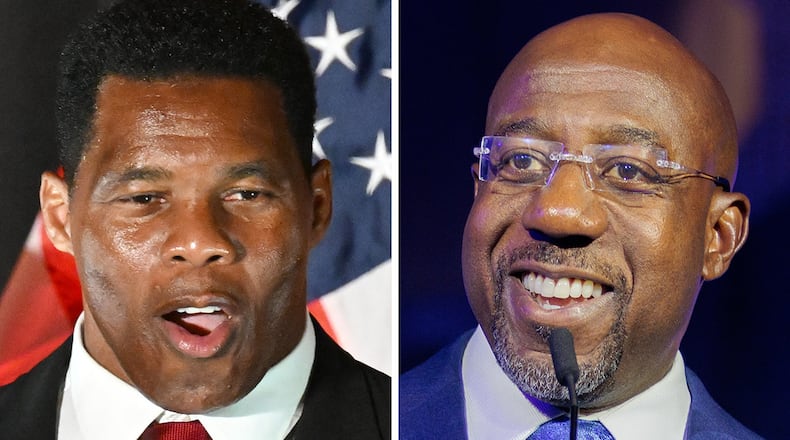U.S. Sen. Raphael Warnock, one of the nation’s most prolific political fundraisers, has always found a national draw for his campaign.
But in the final weeks of the general election and the initial days of his runoff against Republican Herschel Walker, the percentage of campaign donations coming to both campaigns from outside of Georgia increased sharply.
This national interest comes as a result of the high stakes of the Senate race, which at one time was among several toss-up contest that would determine whether Democrats retained control of the chamber. But even though Democrats no longer need Warnock to win to retain their majority, the nationwide attention has not waned.
Some of that is a byproduct of Georgia’s runoff system, which through the years has meant an overtime contest becomes the hot national political story simply because it’s the only race still going on.
“As of now, it is the deciding race, whereas a month ago it was one of a handful,” said Sarah Bryner, research director for campaign finance tracker OpenSecrets. “So, where those motivated donors across the country previously had to split their money between five or six different Senate campaigns, now, it can all go to one. So it’s just as important as it was four weeks ago, but without the distraction of what’s going on in the rest of the country.”
Warnock raised $52.2 million from Oct. 20 through Nov. 16, a period representing the final days of the general election campaign and roughly the first week of the runoff, according to federal campaign finance records. About half, $25.6 million, was required to be itemized with details about each donor, and of that money just 5% came from Georgia.
Reports from earlier in the general election cycle had Warnock raising 11% of itemized funds from Georgians.
Walker collected $20.9 million during the same period. Of his $8.7 million in itemized donations, 13% was from Georgia, compared with 38% in previous reports. Florida also overtook Georgia as Walker’s most lucrative state fundraisingwise.
For the entire campaign cycle, Warnock has raised the most money from California. That continued on the latest campaign finance report.
Mercer University political science professor Chris Grant said this isn’t the first recent Georgia race to attract national attention, noting the 2014 U.S. Senate contest ultimately won by David Perdue was closely watched. A special election for a U.S. House seat in 2017 was ultimately won by Karen Handel, but the runoff catapulted Democrat Jon Ossoff onto the national stage. He eventually won a 2021 runoff for the U.S. Senate.
The Senate runoffs in 2021 were also tracked nationally when it became apparent that if Democrats won both Georgia contests, which they did, they would retake the majority in the chamber.
So the Walker-Warnock contest is just a continuation of that trend, Grant said, even if Senate control is not a factor.
“This is the last political race in the country to be decided, so any political money that’s left at this point — it’s the only place to send it,” he said.
Although Democrats have clinched the Senate majority because the vice president provides the tiebreaker, if Warnock wins the runoff they would have 51 seats and be able to hold a majority of seats on committees. That would make it easier for Democrats to move forward with President Joe Biden’s nominations and to launch investigations. In addition, Vice President Kamala Harris won’t be needed to cast as many tiebreaking votes.
Republican strategist Brian Robinson said deep-pocketed benefactors to both campaigns understand what is at stake.
“Between a 50-50 Senate with a VP breaking a tie and a 51-49 Senate, there is a huge substantive difference,” he said. “I think that for the average voter, that is too nuanced. But for your smart-money donors, it matters.”
Both parties also want the bragging rights of a Georgia win. To Republicans, who swept every other statewide race this year, it would help blunt claims that Georgia is trending toward Democrats. For that reason, Democrats hope to be able to say the party’s successes in Georgia in 2020 and 2021 weren’t a fluke.
Walker’s campaign did not respond to a request for comment about the fundraising numbers, but it did put out a statement Friday criticizing Warnock’s out-of-state fundraising. Warnock’s team said it is focused on demonstrating to Georgia voters that he is a superior candidate to his opponent and has made the case that he deserves a full six-year term.
Recent polling shows results falling within the margin of error, meaning the race is about even. Early voting has been robust, and either candidate could win Tuesday.
And then, both parties and their donors will start looking ahead to the 2024 cycle, Kennesaw State University professor Kerwin Swint said. The winner of Georgia’s race will provide momentum in that pivot to the next election cycle.
“This sort of is the unofficial starting gun for the 2024 cycle where Democrats are going to have at least 21 Senate seats up for reelection,” he said. “And so, both parties would like to get a jump on that, as well.”
Digital specialist Isaac Sabetai contributed to this article.
About the Author
Keep Reading
The Latest
Featured





